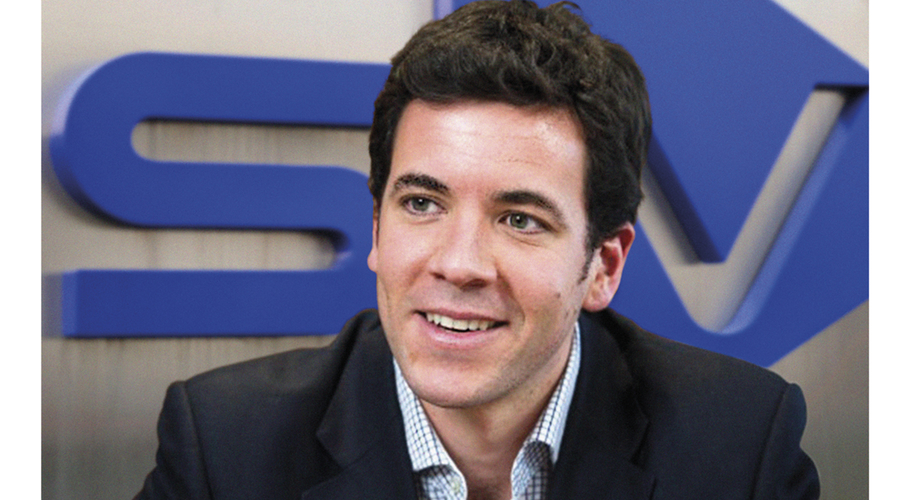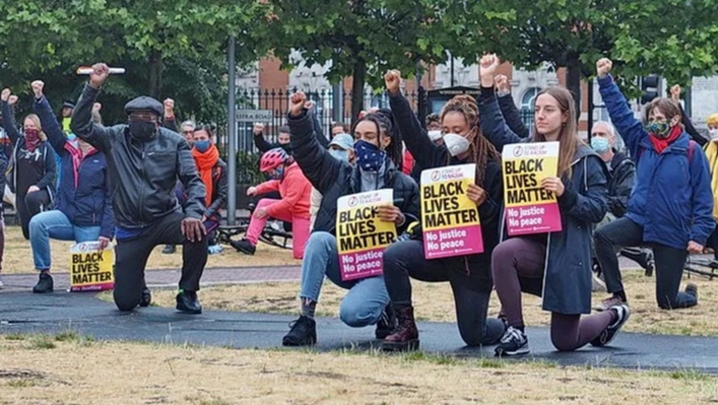While the BBC expands in Scotland, Simon Pitts, appointed CEO of STV last August, is pursuing his own growth strategy. Tara Conlan reports
STV’s new drama The Victim, a legal thriller set in Scotland and made for BBC One, is told through the eyes of both plaintiff and accused. All stories have two sides to them. The narrative concerning the changes going on in Scottish broadcasting is no different.
Glasgow-based STV has a new Chief Executive, Simon Pitts, formerly ITV’s director of transformation and strategy. His new strategy has gone down well in the city and with some producers, but less so with certain journalists and politicians.
Meanwhile, the BBC is about to launch its long-awaited new Scottish channel, having gained approval last month from the regulator, Ofcom.
Pitts hit the headlines in May, when he unveiled his three-year plan to grow the company by closing STV2, its loss making local-TV station, with the loss of 59 jobs. Over the next three years, £15m from these savings will be reinvested in new content, partnerships and the STV Player. At the time, he said that the closure of STV2 was the “result of the challenging economics of local-TV and anticipated increased competition from BBC Scotland”.
The new BBC channel should see more of the licence fee raised in Scotland spent there. The corporation admits that, in recent years, it has returned just 55% to the Scottish creative economy, compared with 95% in Wales. Ofcom says the corporation should spend the same ratio in each nation.
The new BBC Scottish station has an annual budget of £32m and will offer a new 9:00pm news bulletin. The regulator believes the channel will “broaden the options available to viewers in Scotland, provide a greater Scottish focus in its news coverage and deliver more content designed to reflect the lives of people in Scotland”.
To add to the mix, Channel 4 and the BBC are increasing their spending, and Glasgow is on the shortlist of sites for Channel 4’s new outside-London HQ. Ofcom has specified that at least 8% of BBC network programming budget must now be spent in Scotland. Channel 4 is upping the proportion of its content budget that it spends in the UK nations and regions from the current quota of 35% to a new voluntary target of 50% by 2023.
The STV Chief Executive says that the changes he is introducing will “put Scottish TV production back on the map” by “investing in new programming and in digital and simplifying the organisation to set us up for growth”. The company’s output include the veteran BBC series Antiques Road Trip but he wants STV and other Scotland-based production companies to expand their number of returning series.
He also wants to stop the brain drain of talent to London and the US caused by insufficient local TV work.
“Like any business, we’re having to make some tough choices to fund that new investment, but I’m confident we’ve got the right strategy,” says Pitts.
He was grilled by MSPs about those “tough choices” – and about a one-off payment to compensate him for having to give up his ITV shares. “Quite rightly, questions are asked when you make changes leading to job cuts, which is very hard. Those decisions aren’t taken lightly,” he insists.
Although “we’re very proud of STV’s news, which performs fantastically well on the main channel”, Pitts acknowledges that “news consumption is changing fast” – many people get their news on social media.
He wants STV to adapt by introducing more multimedia journalists and new technology, but the station will remain “as committed as ever to local Scottish news”. He adds: “We’re also fully committed to being Scotland’s public service broadcaster. We haven’t, in delivering this new strategy, sought to change a single clause of our PSB licences across STV North or STV Central. We’re briefing Ofcom fully that we are not seeking to amend any of our obligations.”
"This is not in any way a strategy to prepare STV for sale to ITV or to anyone else"
Critics have voiced fears that the pursuit of returnable shows and formats could lead to less news and current affairs. Pitts disagrees: “We will still be spending more than twice as much money on news and current affairs than on any other genres put together.”
Closing STV2 “hasn’t been an easy decision” but “the truth is that the audience isn’t there for this service at the moment, despite our best efforts”.
He points out that the 5:00pm magazine show was attracting 2,100 viewers, while the 7:00pm bulletin got only 1,800: “It’s just not right to ask our teams to make programmes that no one is watching. The economics of local TV are very tough and the expected launch of BBC Scotland will make those economics even tougher. We have made a cumulative loss of more than £3m on local-TV since we started four years ago.”
Pitts says he has “no Scottish ancestry [but] a love of the country”. He will be moving to Glasgow later this year. There is a perception that his arrival, along with another former ITV colleague, David Bergg, as a non-executive director, hints that STV is heading for a sale to ITV. This would, in turn, make ITV more attractive to buyers.
Scotland’s First Minister, Nicola Sturgeon, said recently that this “is not a move I would wish to see”. Pitts was quizzed by MSPs regarding STV shareholder Crystal Amber, the activist fund whose investments have a history of being sold.
So, can Pitts see why people are making assumptions about a sale? “It’s the wrong assumption. This is not in any way a strategy to prepare STV for sale to ITV or to anyone else. That’s not what we are doing… my job is to put in place a compelling growth strategy, not just for digital but for broadcast and production, and to deliver across the company.”
One of his priorities is attracting more young viewers by making shows for STV Player. The broadcaster also has a deal with children’s video app Hopster. And the new partnerships include a tie-up with Elaine Collins, producer of Vera and Shetland, who is developing her next drama with STV. “We have big ambitions for STV Productions,” says Pitts. “We’re already developing ideas for the likes of Facebook, YouTube Premium, Netflix and Amazon.”
These initiatives do not enjoy universal support. SNP culture spokesperson Hannah Bardell MP, who once worked at STV, worries that the changes might lead to a “homogenous” company: “STV’s been a significant part of our landscape and ecosystem. I hope that will not change. Its distinct nature… is important. I wrote to Simon to express concern because I had spoken to people at the company. There was a level of concern that STV was being teed up to be sold on to ITV.”
She paid tribute to Pitts’s predecessor, Rob Woodward, and ex-STV Productions Managing Director Alan Clements, for “a huge amount of work to make sure that STV kept its branding and its identity”. She recognises “that there were challenges with STV2 [but] why not turn that around and do something different? It’s hugely disappointing.”
With Brexit looming, Bardell wants STV and other broadcasters in Scotland to ensure that “they have journalists all across the country”. She adds that it is “a shame Simon sees the BBC channel as competition: he should see it as an opportunity that will drive more content to people”.
Although she believes the new BBC channel’s budget is “reasonable”, the MP has “concerns that it maybe doesn’t have enough to do what some of us would like to see it do”.
Ofcom, however, appears sanguine: “Some stakeholders have questioned whether the budget allocated to the channel would be sufficient for the BBC to deliver on its plans, and have called for additional investment or a different focus for the channel. While no full details on the channel’s schedule are available yet, we are satisfied that the proposal as it is will deliver public value.”
“There’s more opportunity than ever,” says Pact CEO John McVay of the changes occurring in Scotland. “If Simon Pitts gets it right and generates better-quality production coming out of Scotland, that’s good for the Scottish community,” he said. McVay adds that producers should “look for the creative opportunities coming down the line” as new money flows into Scotland from both Channel 4 and the BBC.
Clements, who is setting up his own production company, says that increased spending represents a shift from “the wind in our face to the wind being behind us, and suddenly doors are opening”.






